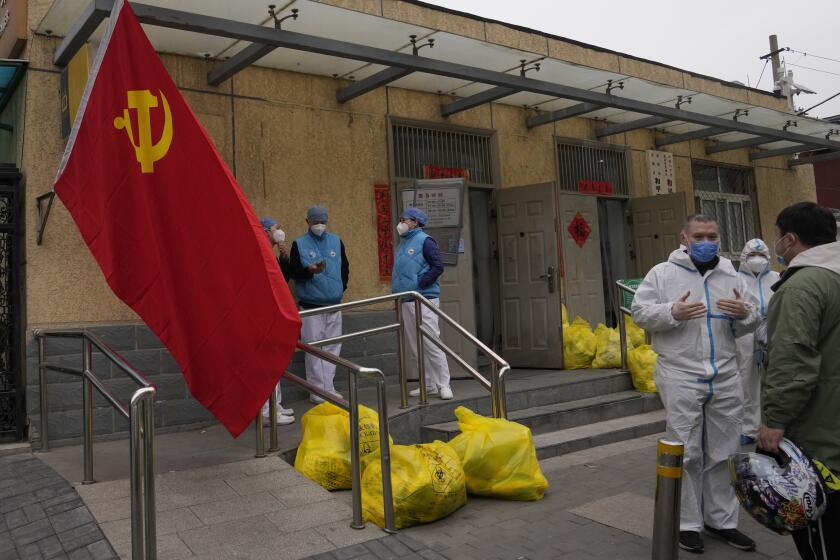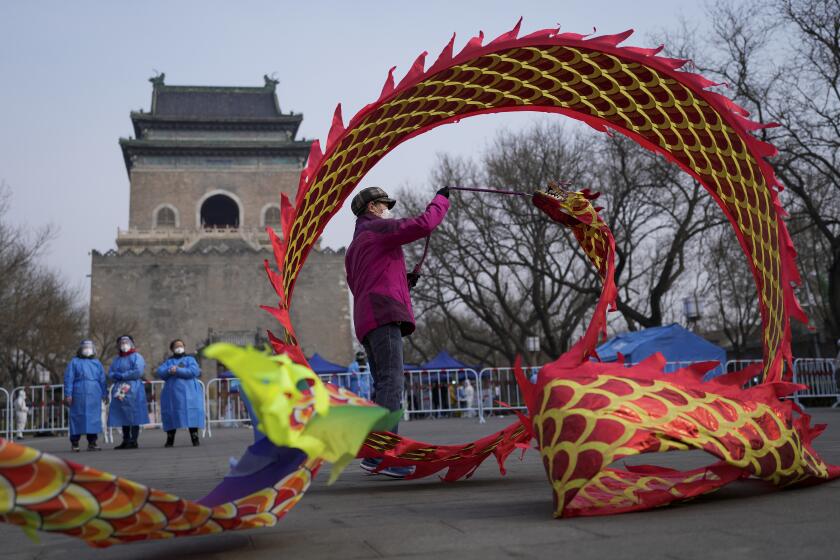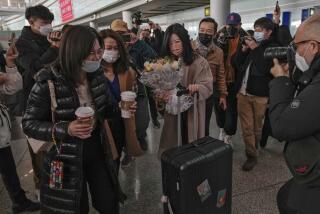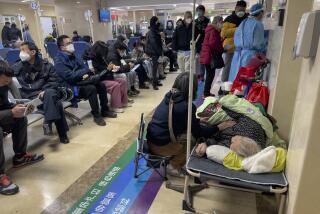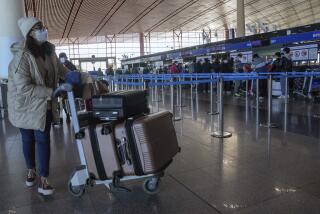Guangzhou closes to most arrivals as China’s COVID-19 outbreak grows
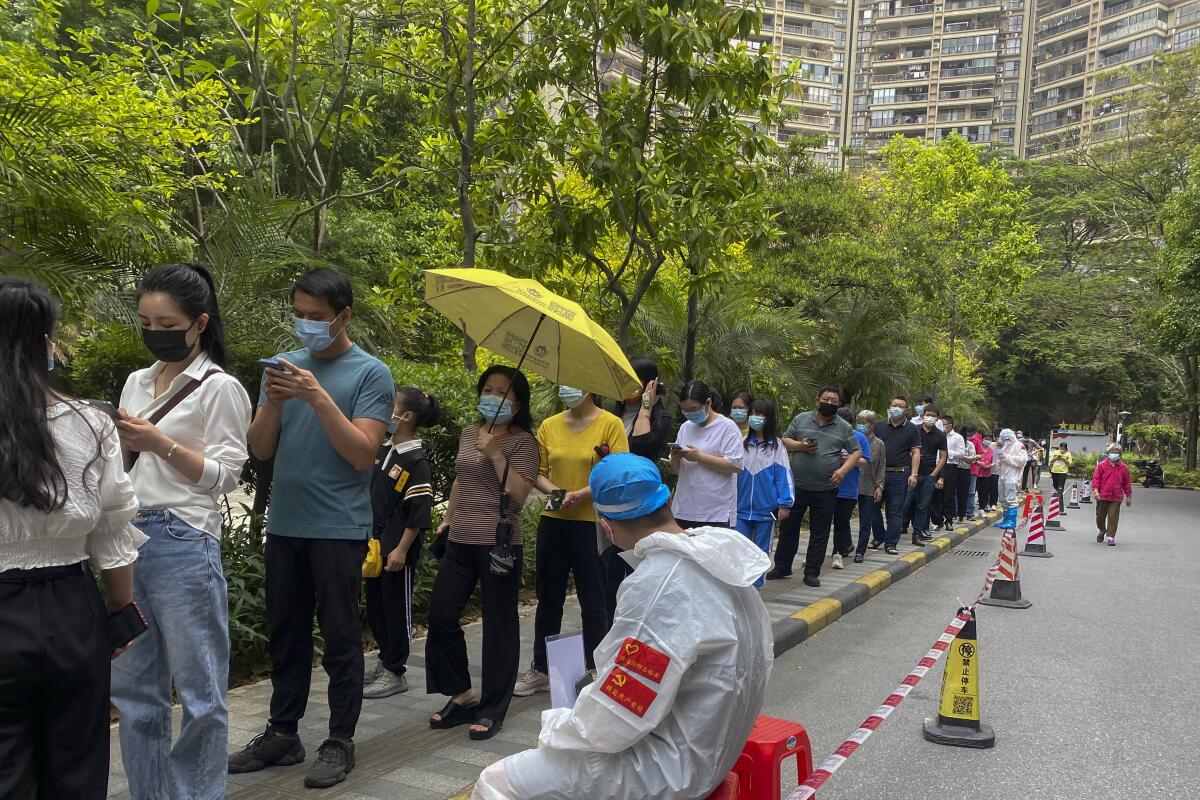
- Share via
BEIJING — The manufacturing hub of Guangzhou closed itself to most arrivals Monday as China battles a major COVID-19 surge in its big eastern cities.
Shanghai has taken the brunt of the rise, with 26,087 more cases announced Monday, only 914 of whom showed symptoms. The city of 26 million is under a tight lockdown, with many residents confined to their homes for up to three weeks and concerns growing over the effect on the economy of China’s largest city.
The financial hub has seen international events canceled because of the crackdown, and local football club Shanghai Port has been forced to withdraw from the Asian Champions League because travel restrictions prevented it from attending games in Thailand.
No such lockdown has yet been announced for Guangzhou, a metropolis of 18 million people northwest of Hong Kong that is home to many top companies and China’s busiest airport. Just 27 cases were reported in the city Monday.
However, primary and middle schools have been switched to online after an initial 23 local infections were detected last week. An exhibition center was being converted into a makeshift hospital after authorities said earlier they would begin citywide mass testing.
Only citizens with a “definite need” to leave Guangzhou can do so, and only if they test negative for the virus within 48 hours of departure, city spokesperson Chen Bin said in a social media announcement.
China has stuck to its “zero-COVID” strategy of handling outbreaks with strict isolation and mass testing, despite complaints in Shanghai over shortages of food and medical services.
Even as China locks down cities in its worst coronavirus outbreak in two years, it could be seeking an exit from its ‘zero-tolerance’ COVID policy.
China’s government and the entirely state-controlled media are growing increasingly defensive about complaints over the COVID-19 prevention measures, censoring content online and rebuking foreign critics.
Foreign Ministry spokesperson Zhao Lijian on Sunday said China had “lodged solemn representations with the U.S.” after the State Department advised Americans to reconsider traveling to China due to “arbitrary enforcement” of local laws and COVID-19 restrictions, particularly in Hong Kong, Jilin province and Shanghai. U.S. officials cited a risk of “parents and children being separated.”
China was “strongly dissatisfied with and firmly opposed to the U.S. side’s groundless accusation against China’s epidemic response,” Zhao said.
Despite that, and indications the hardline policy is being dictated by head of the ruling Communist Party Xi Jinping, China has rejected any notion that its response is political in nature. Xi has demanded social stability above all else in the runup to a key party congress later this year at which he is expected to bestow on himself an unprecedented third-term as party leader.
The English-language China Daily acknowledged that Shanghai’s measures are “far from perfect,” and pointed to the firing last week of three local officials for failing in their duties. But it said that shouldn’t become an “excuse to politicize the event and blame China.”
The World Health Organization says new coronavirus cases globally increased by 7% in the last week, driven by the Western Pacific.
Zhao issued a further defense of China’s virus controls Monday, saying they have “proven to be effective and in line with its national conditions and needs, and have made an important contribution to the global fight against the epidemic.”
Shanghai has brought in thousands of additional health workers from other cities, provinces and the military. Despite the large number of cases, no new deaths have been reported in the Shanghai wave, possibly because the Omicron variant is less deadly than older variants.
City authorities also say they have secured daily supplies for residents, following complaints about deliveries of food and other necessities.
Residents have resorted to group buying of groceries because they are not allowed to leave their buildings, with only partial success in obtaining needed items.
Officials say they will begin relaxing restrictions beginning with areas where no new infections have been detected for two weeks. Residents will be allowed to move around their districts while remaining socially distanced.
A second category will be allowed to move around their neighborhoods, while others will remain isolated in their homes.
Chinese club Shanghai Port has been forced by the city’s COVID-19 lockdown to withdraw from the Asian Champions League, the Asian Football Confederation (AFC) said Monday.
Due to travel restrictions in the city, Port was unable to make the trip to Thailand for six Group J games.
Its first game was scheduled on Saturday against Vissel Kobe of Japan.
“The AFC acknowledged the travel restrictions faced by Shanghai Port FC as a result of the recent lockdown measures enforced in Shanghai,” the AFC said in a statement.
The capital, Beijing, has seen relatively few restrictions, although the Erjiefang neighborhood including the famed 798 art district has been cordoned off and classified as high risk after eight infections were reported there over the last two weeks.
China is facing one of its worst local outbreaks since the pandemic began. China is still mostly closed to international travel, even as most of the world has sought ways to live with the virus.
More to Read
Sign up for Essential California
The most important California stories and recommendations in your inbox every morning.
You may occasionally receive promotional content from the Los Angeles Times.
